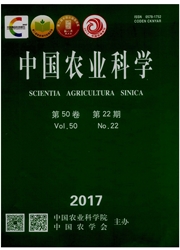

 中文摘要:
中文摘要:
【目的】采用来自滇西南山区的农户调查数据,分析杂交玉米技术对农户收入、农户生计策略和农户间收入不均等的影响。【方法】利用可行性广义最小二乘法回归分析农户收入决定因素和农户生计策略决定因素,并采用基于回归分解的方法测度杂交玉米技术采用对农户间收入差距的贡献。【结果】杂交玉米技术采用对农户人均纯收入提高有显著的正向作用,杂交玉米面积比重每增加1%,农户人均纯收入增加0.5%;杂交玉米种植面积比重每增加1%,农户人均粮食作物收入增加2.5%。杂交玉米技术采用对农户间收入不均等的效应仅为0.005。【结论】在滇西南山区,杂交玉米技术既可增加农户收入又不会导致农户问收入差距扩大。
 英文摘要:
英文摘要:
[ Objective] The impact of hybrid maize technology on farmers' income, livelihood strategy and income disparity was analyzed by employing rural household survey data from mountain regions of Southwest Yunnan. [Method] Using Feasible Generalized Least Square and Regress-base Decomposition approach, this paper studied the determinants of farmers' income and livelihoods, and estimated the contribution of adoption of hybrid maize technology to income disparity. [Result] The adoption of hybrid maize technology had a significant positive effect on farmers' income. Rural households net income and food crop income increased by 0.5% and 2.5%, respectively, when the area of hybrid maize increased by 1%. The effect of adoption of technology on income inequality was just 0.005. [Conclusion] In the mountain regions of Southwest Yunnan, hybrid maize technology is an appropriate technology, which can increase farmers' income and not worsen the income disparity among farmers.
 同期刊论文项目
同期刊论文项目
 同项目期刊论文
同项目期刊论文
 期刊信息
期刊信息
